One family's story of perseverance through Hurricane Harvey: After Landfall
One family lost a home, welcomed a new baby and found hope after Harvey.
— -- Five days after Hurricane Harvey slammed into the southern coast of Texas, William Weeks came face to face with his worst nightmare.
Just a month before, he and his wife, Danielle Weeks, had been giddy as they moved their two young daughters into an RV park in Port Aransas, Texas. Living by the beach had been their dream, and with another baby on the way, they felt things were finally falling into place.
After the storm hit, Weeks made his way to his family’s home for the first time. What he found were the remnants of that life, remnants of everything he had worked for. He struggled to make his way through the park, where trailers had been tossed around like toys. He and his mother found his family’s home on its side, wedged between a tree and a car, two parking spots from where he left it.
Most of the contents — from fishing rods and spatulas, to bathing suits and children’s books — were on the ground, covered in mud. From the debris, his mother plucked the dress his 5-year-old daughter, Annabella, wore to her first day of kindergarten. Emblazoned with an anchor, it was a gift from her and a nod to what was meant to be the family’s new life by the beach.
In tears, Weeks added the dress to a pile of other belongings he managed to salvage, including some of 1-year-old Alizabeth’s toys and books.
“When you’re actually there, looking at it, looking at your belongings all over the ground, you just cry,” Weeks told ABC News.
“It was almost like a war zone,” he added. “I’ve never been through anything like that before.”
Just the day before, his wife had given birth to the couple’s third child, Loralynn. He was still wearing a hospital bracelet on his wrist.
“It was intense, crazy, different emotions — from bottom-of-the-barrel sad to giving birth to a new baby that brought so much hope,” he said.
Now — like more than 70,000 other Texans displaced by Harvey, according to the Federal Emergency Management Agency — he would have to find a new place for his young family to live.
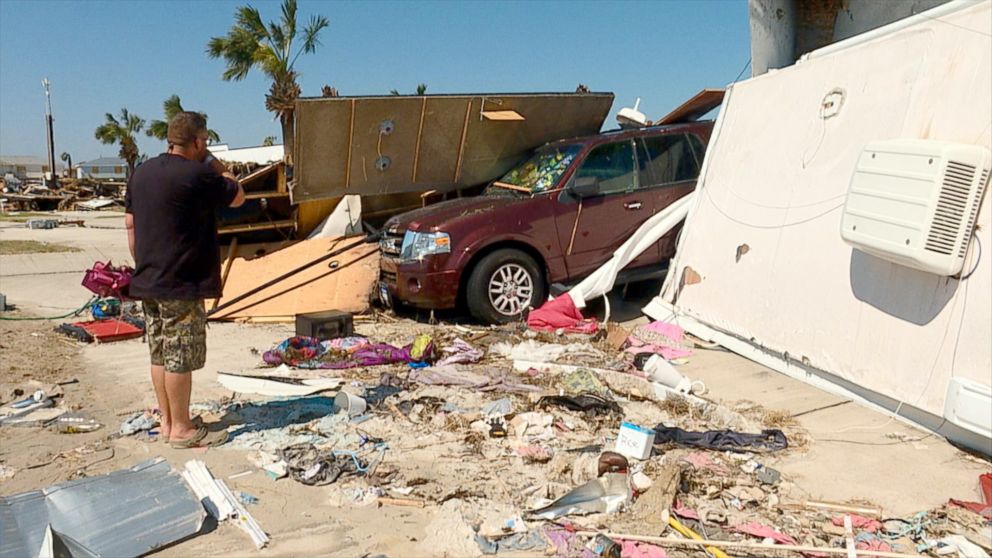
‘We were just being hopeful’
The tumultuous two weeks that would dramatically change the Weeks’ lives started on Friday, Aug. 25. Hurricane Harvey was barreling toward the Corpus Christi area of Texas, forecast to be a Category 3 storm or stronger when it made landfall. Only 40 hours before, the National Weather Service had predicted the storm would hit as a tropical depression. But it was gaining strength as it moved toward the coast. The Weeks family scrambled to prepare.
Aside from securing their new home, the family faced a more pressing challenge. Danielle Weeks was nine months pregnant and had been advised by her doctors not to travel far from Corpus Christi, where she had a cesarean section scheduled for the following week.
If she missed her C-section because of the storm, it could put her life and her baby’s life in danger. But if she went into labor early, during the hurricane, it could also prove dangerous.
So the young family made a last-minute decision to leave their RV in Port Aransas and ride out the storm at a Holiday Inn in downtown Corpus Christi.
“We thought it would do a little bit of damage to the trailer,” Danielle Weeks told ABC News. “I guess we were just being hopeful.”
Harvey was the family’s first hurricane and, as it came closer to landfall, she wondered what would become of their home.
“We’ve lived in Texas pretty much all of our lives. So Port A was always our vacation home,” Danielle Weeks said. “We honeymooned here after our wedding. It had always been our dream to move down here one day, and we were finally able to do that.”
The angst they felt about their choice to leave the RV behind was palpable.
“We’re pretty worried that we won’t have a home to go back to,” she said choking up as she sat on her bed in the Holiday Inn.
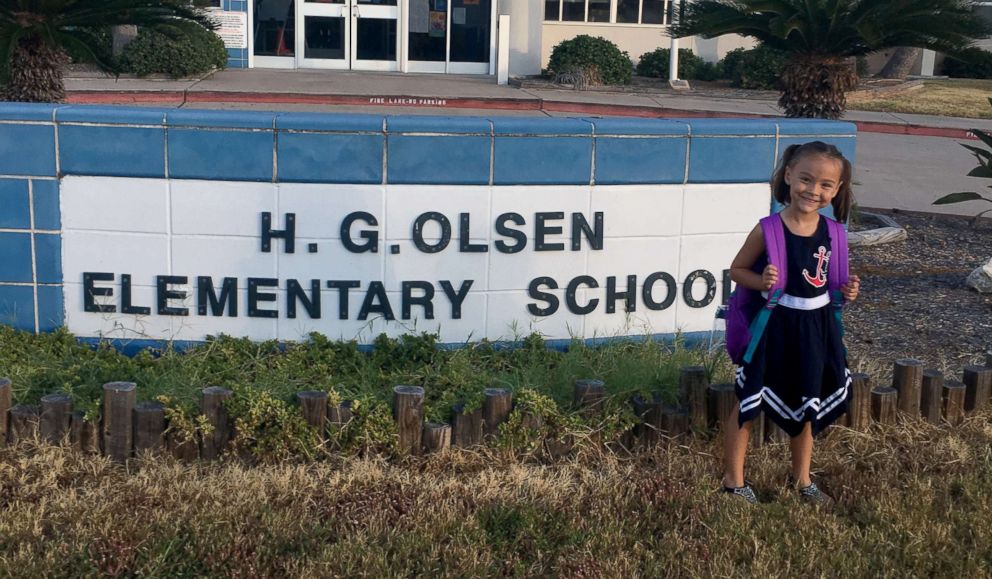
That evening, Harvey made landfall as a Category 4 hurricane with maximum sustained winds of 130 mph. Storm surges in the town of Port Aransas were recorded to be at least 6 feet, according to the National Weather Service.
“As the storm moved through, it sounded like it was a train going through our balcony,” William Weeks recalled. “You could hear the balcony door vibrating due to the winds. [We] got close to putting a mattress up. It was intense. I don’t think many of us got sleep that night.”
The couple tried to stay cheerful for the children, who had no idea what was happening outside.
“The kids slept through it,” Danielle Weeks said.
“At their age, they don’t really know what was going on,” William Weeks said. “It was more a vacation. They were upset that the pool was closed.”
‘Hoping for the best but expecting the worst’
The next morning, Aransas County awoke to find close to 80 percent of its buildings were damaged, ABC Corpus Christi affiliate KIII-TV reported. The neighboring community of Rockport, where the storm made direct landfall, saw roofs torn off stores, brick walls blown out and a total communications blackout after local cellphone towers went down.
Immediately after the storm, Port Aransas did not get as much media attention as Rockport. The Weeks family struggled to find information about what became of their town — and the little that trickled out was not good.
"People who stayed, who didn’t leave the island, were saying that it was destroyed,” William Weeks said.
“The anticipation of not knowing was getting to us,” Danielle Weeks said.
So on Saturday afternoon, close to 24 hours after Harvey’s landfall, the family decided to try to check on their home. ABC News accompanied them on the drive.
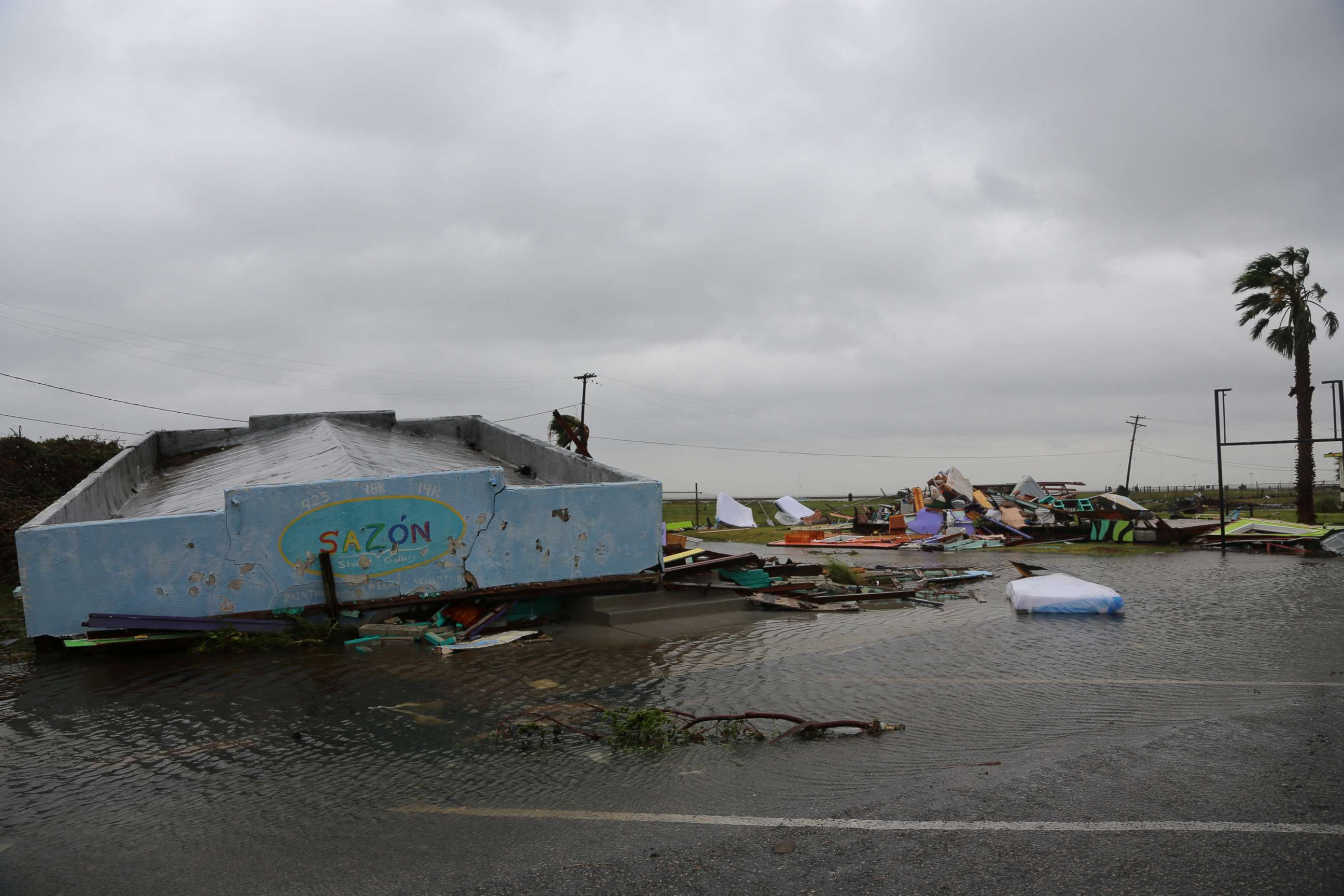
“I’m hoping for the best but expecting the worst,” Danielle Weeks said in the car on the way there. “I just hope that if it is the worst, we can at least get some of our stuff I didn’t think to pack or we didn’t have room to pack.”
When they reached the outer limits of Port Aransas, they were stopped at a police checkpoint.
An officer walked up to the Weeks’ car window.
“We’ve got an active search-and-rescue going on right now. No one’s allowed in until that’s taken care of,” the officer said. “We have a list of about a hundred people that we’re still trying to find.”
Shocked, William Weeks turned to his wife, who was wiping away tears.
“I’m just worried about all the people they’re looking for,” Danielle Weeks said. “Like I said, our belongings can wait or be replaced. People’s lives can’t.”
Then 5-year-old Annabella began to cry in the backseat.
“She didn’t really understand that a storm had come and our house was potentially damaged,” Danielle Weeks later said. “It was heartbreaking seeing her upset. And I didn’t know how I could explain to her why we couldn’t go in there.”
“I think that’s the worst part as a parent,” she added. “When something comes up and you have no control over how it affects your kids.”
The family was forced to turn back, but authorities allowed ABC News to enter Port Aransas. William Weeks gave ABC News permission to check on his home.
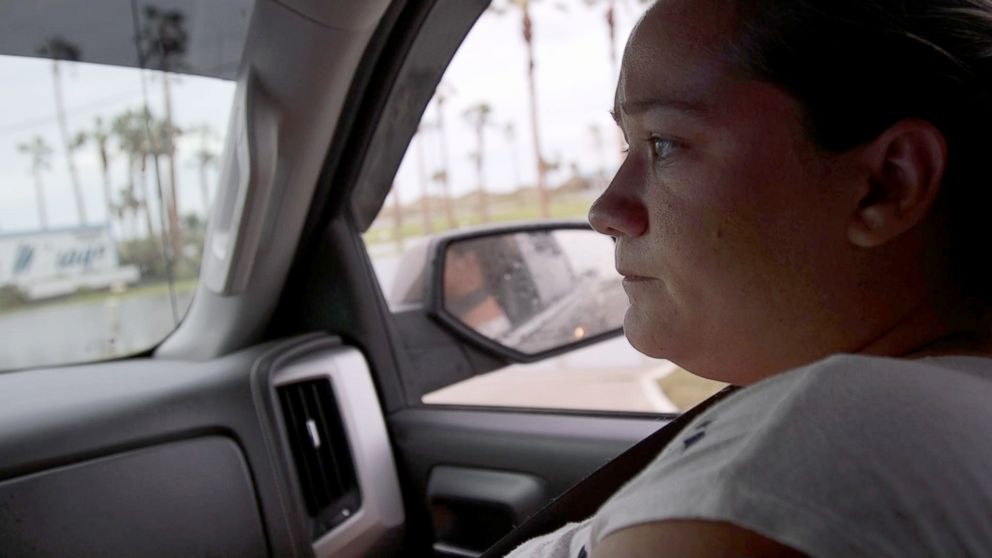
The RV had been thrown onto its side and slammed up against a tree, and its contents had spilled everywhere. ABC News recorded the scene and took the video back to the family.
“I could see my kids’ stuff outside on the ground, and my house was turned over on its side,” Danielle Weeks recalled, in tears.
On Monday the couple decided to focus on applying for assistance, as more than 13,000 of people in Port Aransas would, according to FEMA. While William Weeks sat on hold on the phone, Danielle Weeks filled out the online paperwork. It was just 24 hours before her scheduled C-section.
“I’m excited to see her and get to hold her,” Danielle Weeks said of her baby while filling out the paperwork. “But at the same time, it’s a very overwhelming feeling knowing that I don’t have a home to take her to and that her big sisters are without a place to stay right now too.”
At her feet, Annabella played with tiny Smurf dolls on a carousel, absorbed in her own little world.
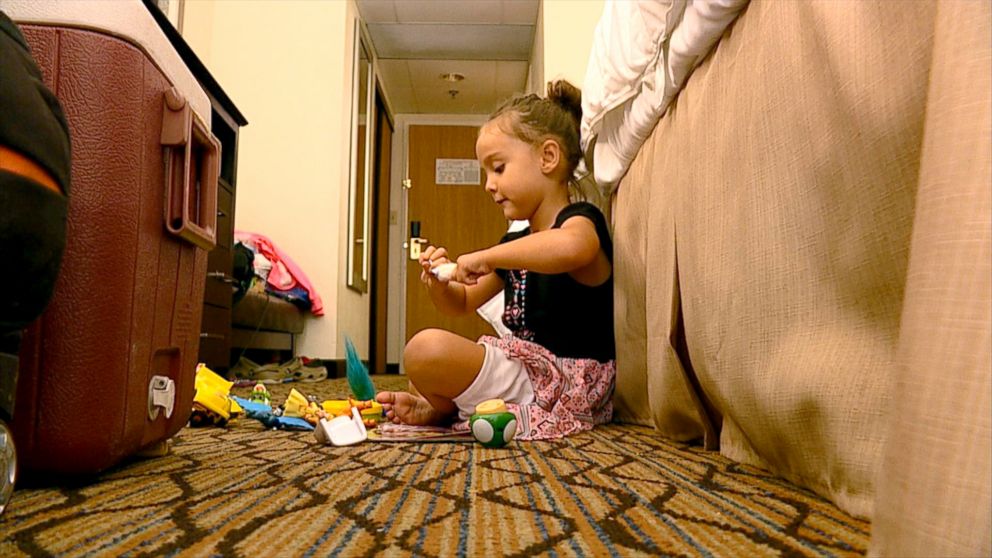
‘The happiness we needed after the down’
The next day, the joy of their new baby temporarily put the stress of homelessness on hold. At 7:30 a.m., Danielle Weeks was wheeled into surgery at a Corpus Christi hospital, and 41 minutes later, Loralynn Cole Weeks was born.
“Light at the end of the tunnel for us. The happiness we needed after the down,” William Weeks said of the birth of his daughter. “She was a blessing.”
William Weeks followed the nurse, beaming with happiness, as baby Loralynn was brought out of surgery.
“I just stared at her and thanked God she was OK,” he said. “Just an amazing little baby. Precious.”
All eyes were glued to the family’s newest addition as she met her sisters, Annabella and Alizabeth Weeks. Annabella scrunched up her face in glee as she held her for the first time.
Alizabeth poked Loralynn as she slept, unsure of what this new creature would mean for her status as the baby of the family.
“That’s the only thing that matters — our family,” Danielle Weeks said. “Making sure that we all stay together.”
“Everything else is replaceable,” William Weeks said.
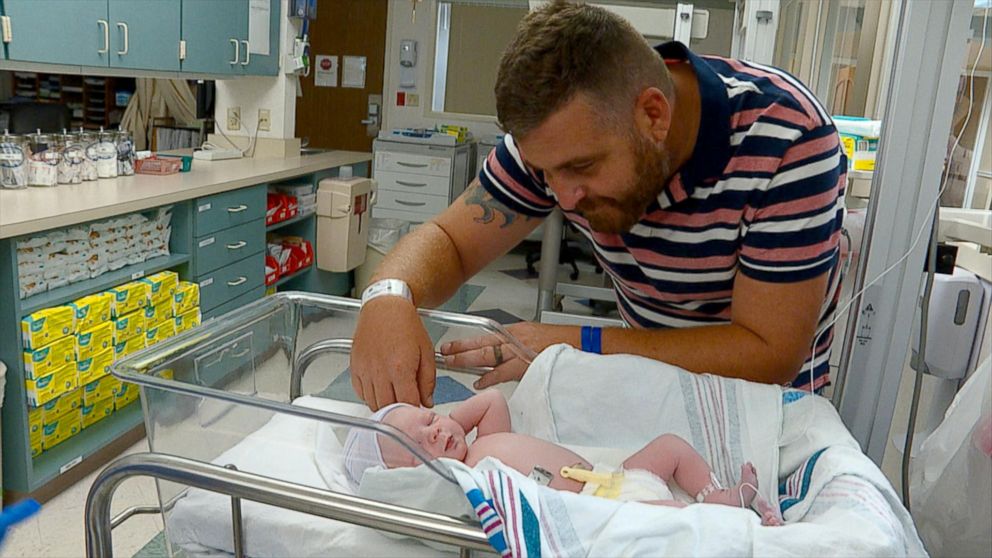
‘There’s no fixing it’
The next day, William Weeks went to meet a FEMA representative at his RV. It was the first time he would see his home with his own eyes. His mother went with him.
He called his wife in tears as he picked up the pieces of their lives.
"All sides, demolished. There’s no fixing it. It’s history. It’s a goner. Everything is,” he told his wife over the phone, who was still recovering in the maternity ward.
“I found Bella’s first outfit for school,” he added, his voice cracking. “We’re bringing it back with us.”
A neighbor offered to make a hole in the RV with his chainsaw so William Weeks could collect what he could from inside. He put everything he wanted to save on a toy wagon. Only a few things had survived.
“It’s even hard to put it in words,” William Weeks later said. “Your heart drops. It was hard.”
“I was worried," Danielle Weeks said. "What were we going to do?”
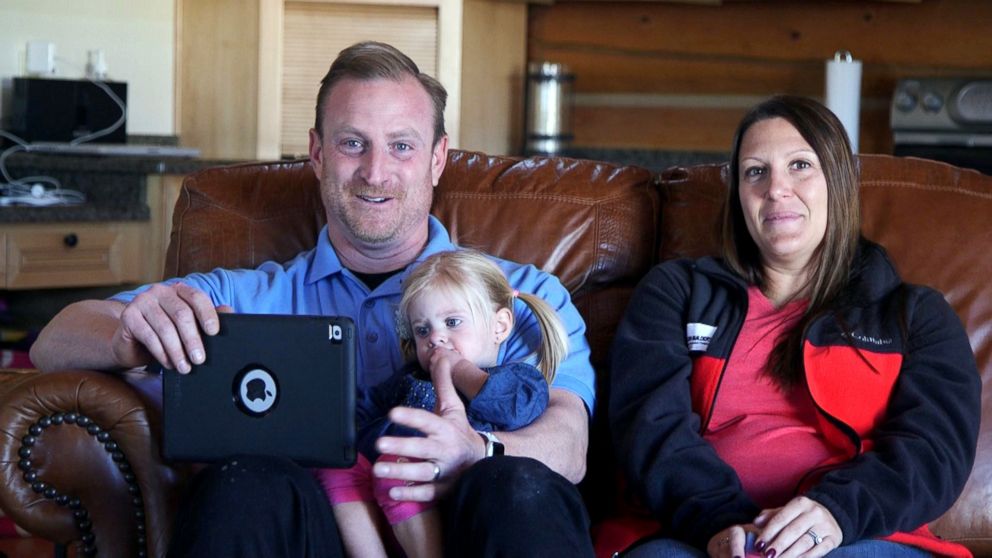
‘All the things a family needs’
Two states away, in a polar opposite climate full of ski slopes and cabins, the Nelson family watched the Weeks’ plight on TV.
“When we heard the story on ABC, we just kinda — I blurted it out, I think. I just said, ‘Why don’t we just give them it? Give them the tiny house,’" Steve Nelson later told ABC News.
Steve and his wife, Candice Nelson, own a construction company, Nelson Builders, in Durango, Colorado.
The couple had been experimenting with building tiny homes.
“It’s got all the things that a family needs, obviously,” Steve Nelson said of the dwellings, which are a few hundred square feet but contain a kitchen, bathroom and sleeping lofts.
The Nelsons had built a predesigned tiny home as a way to work with the local authorities to see if their prototypes would pass local code.
“I remember when I was still in the hospital having [my daughter] Aspen and not having anything to worry about except for having a child,” Candice Nelson told ABC News. “And I couldn’t imagine being there, trying to be happy about my child coming in, thinking about all the things I don’t have and how am I going to take care of this child?”
“We literally said, ‘Well, I don’t know what I would do if that was us,’” she added.
A 330-square-foot home had been sitting vacant in their driveway for weeks. They found that many buyers who wanted tiny homes preferred to customize them instead of buy predesigned ones, so the prototype likely wouldn't sell. They decided to contact ABC News on Twitter.
“Would like to donate a 330 sqft tiny house to this family. Please let us know if you can help us do that,” Nelson Builders tweeted to ABC.
After asking permission from the Weeks family, ABC News replied to Nelson Builders in a direct message on Twitter and provided William Weeks’ cellphone number.
“At that moment, we didn’t know if it was going to happen, but it definitely brought back a lot of hope for us,” William Weeks recalled.
The Nelsons set out to furnish the tiny house before driving the more than 1,000 miles from their home to Corpus Christi to deliver it. They said their church, restaurants in Durango and friends chipped in and donated a mattress and other household items.
“It wasn’t an easy trip. We were on two-lane highways for most of it,” Steve Nelson said, laughing. “It was a journey.”
When William Weeks heard that the Nelsons, whom he had never met, were on their way with the house, he said he felt a surge of hope.
“At that point is when it really sank in for me,” he said. “And I was like, holy moly, it’s real!”
On Sunday, Sept. 10 — more than two weeks after Hurricane Harvey made landfall — the Nelson family pulled the brand new tiny house into the Corpus Christi RV park that would soon become the Weeks family’s new home.
“We felt good when we got there and we saw the family and their faces lit up at the house,” Candice Nelson said. “And the kids were so happy.”
The exchange was brief: Both families said they remembered feeling overwhelmed by the moment.
“Thank you, thank you, thank you,” William Weeks said on the day.
“It means more to us than we can say in words,” his wife said, her voice cracking.
William Weeks said the tiny house gave them the ability to move on with their lives after Harvey.
“It was a great feeling, from being basically at the bottom to where is our life going, to OK, now we have a game plan, now we can start getting everything lined out,” he said.
For the Nelsons, it was a way to put their craft to work helping others.
“We wish we had a fleet of tiny houses we could just give to people,” Candice Nelson said with a smile. “That would be nice. Maybe someday.”
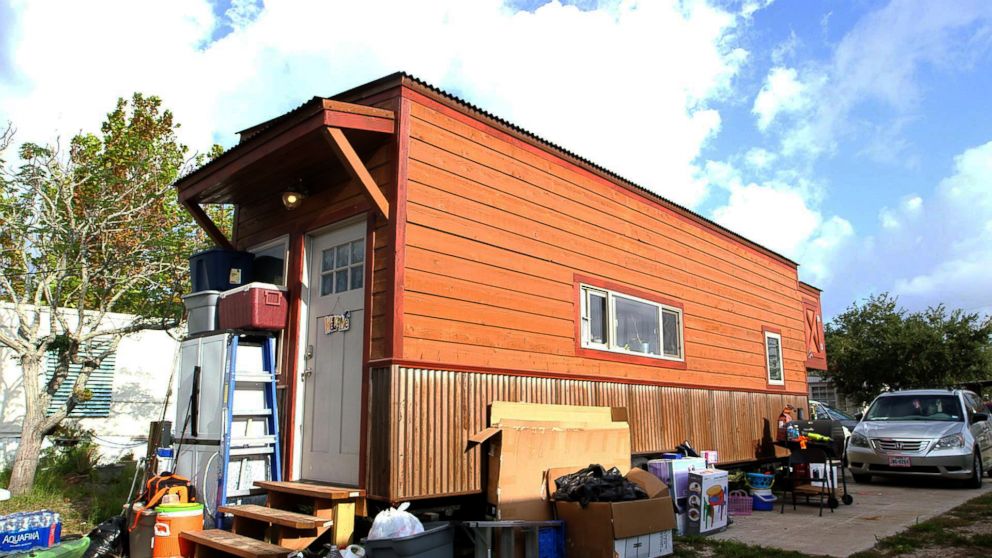
‘It’s finally starting to feel like home’
Today, it’s as if the massive Category 4 storm was a lifetime ago.
Annabella is enrolled at a local elementary school, where she said she loves the library and the playground. She is taking a speech therapy class, and her mom said the 5-year-old is making big strides.
While Annabella is at school, Danielle Weeks stays home with Alizabeth and Loralynn. On the first floor of their tiny home, there’s a futon next to the door with a TV on the opposite wall. A few steps farther inside is a full kitchen with a stove and oven and a bathroom behind it. Above the kitchen and futon, there are two lofts on either side of the house, which the family uses as bedrooms.
“Being a stay-at-home mom is my job, so I guess I have my office back,” Danielle Weeks said with a laugh.
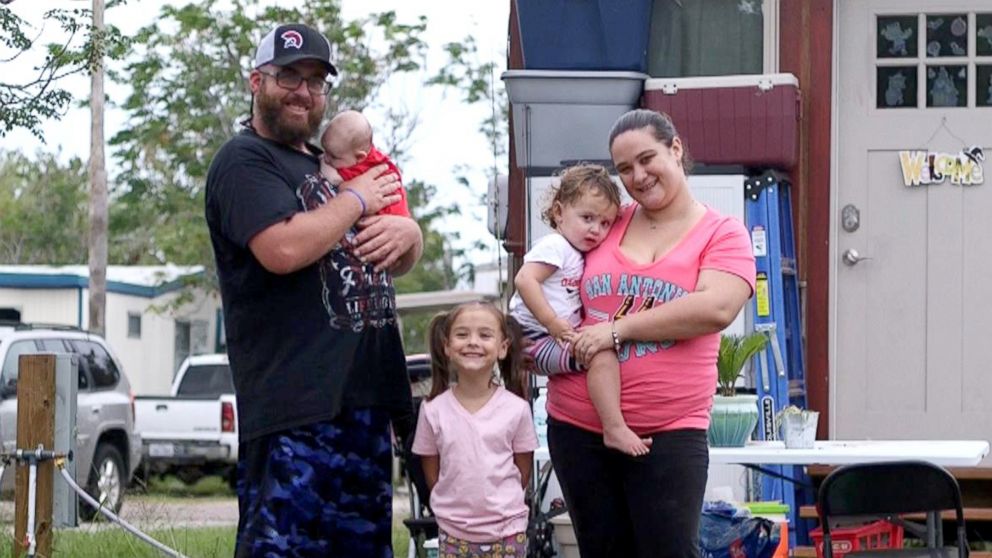
In December, the Weeks family put a little Christmas tree in the corner in preparation for their first holiday there.
William Weeks said he decided to take some time off from work after the storm to help his wife and kids settle into their new life. He had been working in a town three hours away, and said he didn’t think it was feasible to continue that schedule during their transition.
“I’m looking at a couple different options,” he said. He had worked as a project foreman before and said he figured the area would likely need his expertise once the cleanup period is over.
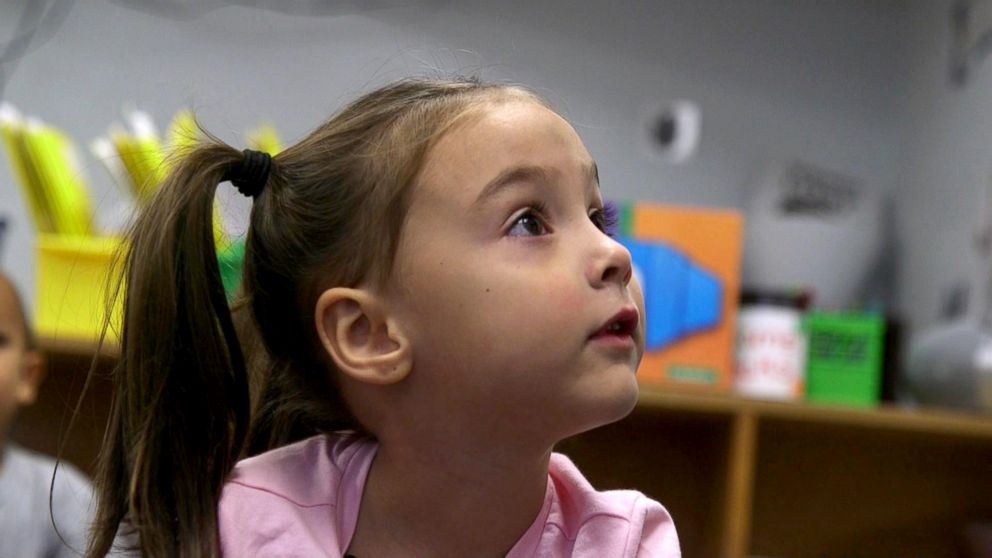
Danielle Weeks said she knew life was returning to normal when Annabella made a casual comment after school one day.
“She came in and put her backpack down and said, ‘It’s finally starting to feel like home,’” Danielle Weeks said. “And that’s when I knew we would be OK.”
Annabella even has her kindergarten dress with the little anchor back. Two months after landfall, Danielle Weeks held it up, and it looked brand new.
“We put it through a washing machine twice, double soap on the second load,” William Weeks said. “It was a little challenge.”
“I’m glad he saved it,” Danielle Weeks said with a smile.
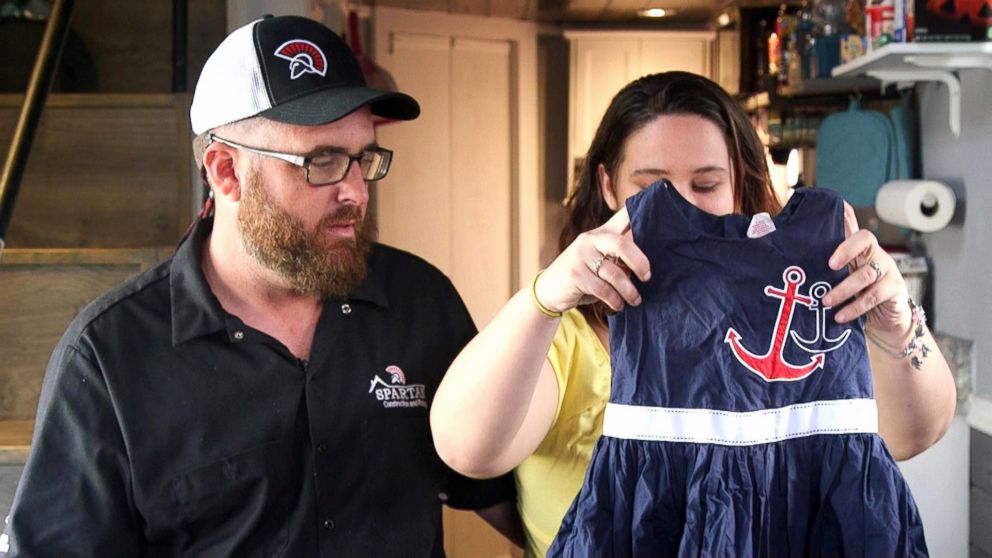
As they reflected on the summer that changed their lives, Danielle and William Weeks said they believe Harvey brought them closer and made them stronger.
“Our family definitely came out stronger,” Danielle Weeks said. “Me and Willy came out stronger as a couple. I came out stronger as a person.”
“You never know what Mother Nature is going to throw at you,” William Weeks said.
“It definitely showed there’s still great people in this world, that people still do care about other people," Danielle Weeks said.
ABC News’ Adam Rivera, Kaelyn Forde, Andrea Miller and Matt Gutman contributed to this report.




